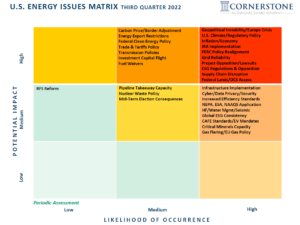The energy crisis in Europe resulting from Russia severely curtailing gas exports to Europe was the issue with the highest ranking in the red section of Cornerstone’s Q3 U.S. Energy Issues Matrix. High energy commodity prices and geopolitical conflicts resulting from the ongoing war in Ukraine continue to impact the entire global economy and inflation as well as energy supply and demand. Europe faces a potentially devastating winter as the U.S. attempts to provide its allies energy to make up the shortfall.
Another major development in Q3 was the passage of the Inflation Reduction Act (IRA), which provides $369 billion in incentives for energy security and climate change, with significant tax credits, loans and grants for renewable energy, carbon capture and storage and nuclear energy. The IRA also directs the Interior Department to hold onshore and offshore oil and gas lease sales, increases the royalties and fees for oil and gas activities on federal lands and the Outer Continental Shelf and places a fee on industry for methane leaked. Passage of a federal permitting bill, promised to Senator Joe Manchin (D-WV) for his vote on the IRA, is uncertain, with Democratic opposition growing.
U.S. oil and gas producers continued to face challenges from project opposition and lawsuits, supply chain interruption, the strict application of environmental regulations and leasing and offshore and onshore permitting challenges. Rolling blackouts in California highlight ongoing questions over grid reliability and the need for federal transmission policies.
Global trade issues were also dominant as the U.S. looked at adjusting its trade and tariff policies and some politicians contemplated energy export restrictions, while Europe moved further toward implementation of its Carbon Border Adjustment Mechanism and the EU’s gas policy. In the U.S., natural gas faced challenges from FERC’s policy realignment and tightness in pipeline takeaway capacity, as industry tries to fulfill short- and long-term commitments to supply more LNG to meet Europe’s gas shortfall.
ESG continues to be an important and evolving issue for the energy industry. A proposed SEC rule that would require greenhouse gas emissions disclosures by public companies and other climate-related information could get promulgated as early as October. At the same time, there is growing opposition to ESG from political and business communities. Not helping ESG’s reputation is a lack of consistency in global ESG reporting methodology and standards, making disclosures more difficult.
Moving into the Fourth Quarter, midterm elections will be consequential for the energy sector regardless of which party is victorious. We also anticipate a long and complicated implementation of the IRA, and a potentially tumultuous situation in Europe as colder temperatures set it in.


